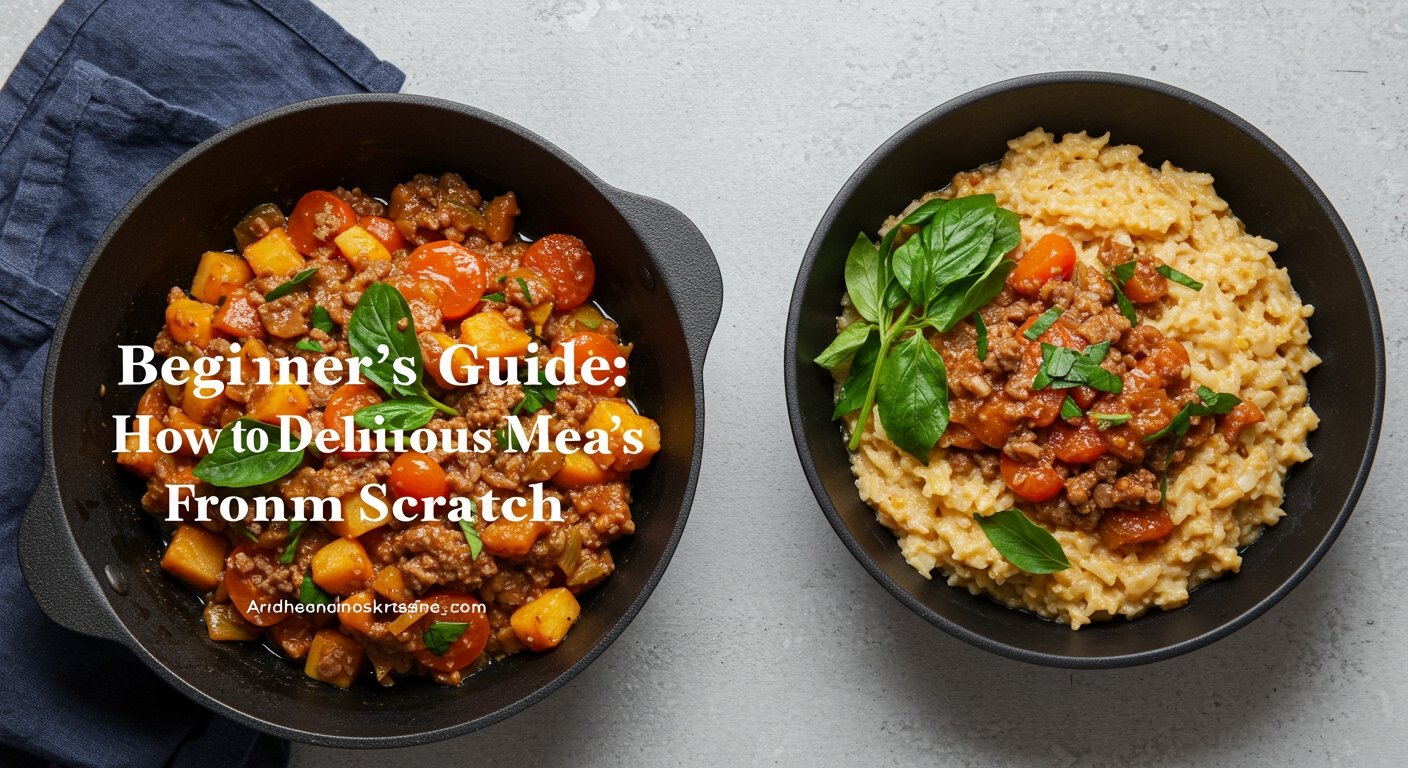Are you tired of takeout, expensive restaurant bills, or relying on pre-packaged meals? The idea of learning how to cook from scratch can feel daunting, especially for beginners. You’re not alone; “more than one-quarter (27%) of respondents admit they are intimidated by cooking a meal from scratch.” [Data] Many worry about time, cleanup, and complex recipes, with “half (50%) of respondents most concerned about time constraints when preparing dinner, 43% dread the cleanup, and 39% feel recipes are too complex.” [Data] But imagine the satisfaction of creating nourishing, flavorful dishes in your own kitchen.
This comprehensive guide is designed to demystify the process, offering practical advice and easy scratch cooking recipes to help you gain confidence and enjoyment in your culinary journey. Cooking at home offers numerous benefits, from saving money—”64% of Americans continue to cook at home to save money and control their budget” [Data]—to eating healthier meals, which is “the top reason for cooking meals completely or partly from scratch, cited by over half of home cooks.” [Data] In fact, recent data from June 2024 shows “57% of Americans report they are eating at home more than usual for this time of year,” an increase from pre-pandemic levels. [Data] Let’s dive in and transform your kitchen into a hub of delicious, simple homemade meals.
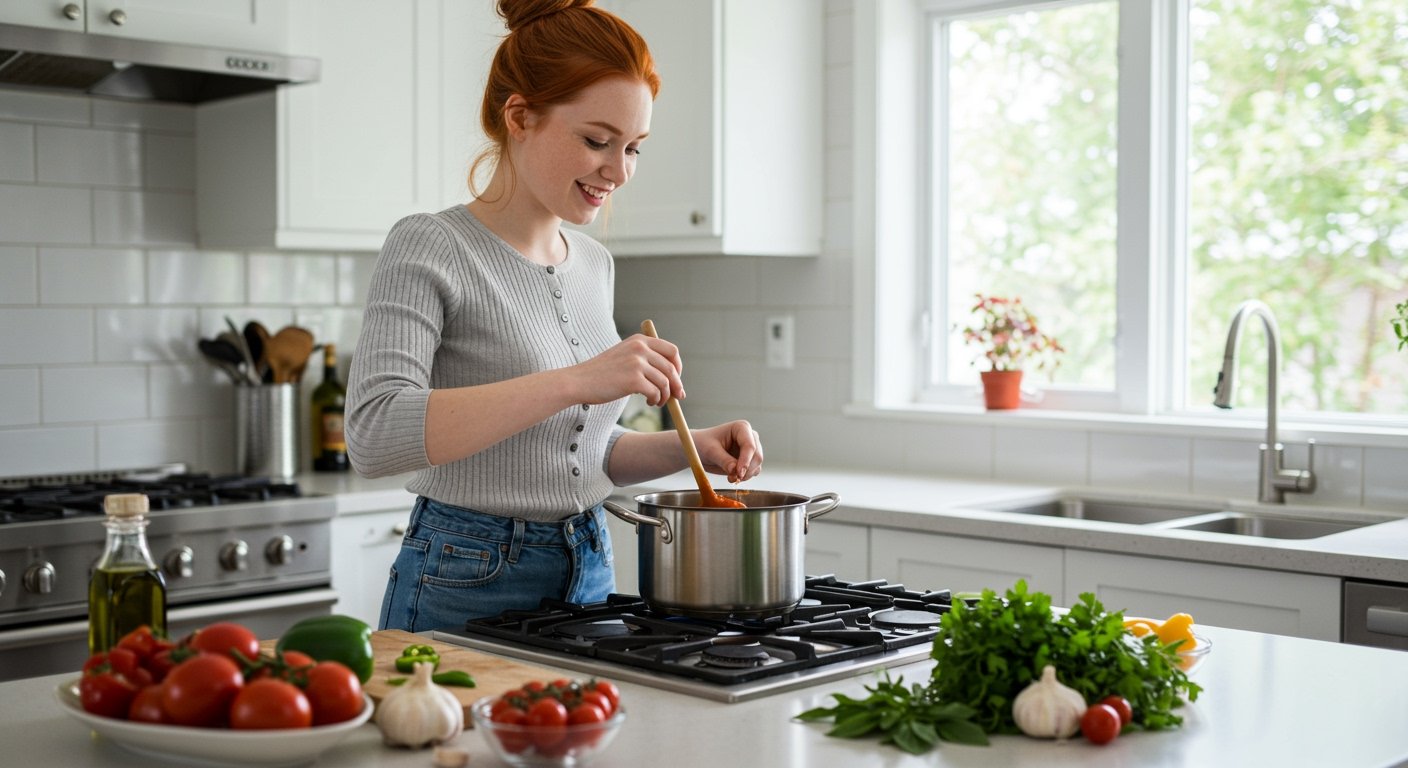
Why Cook from Scratch? The Benefits Beyond the Plate
Beyond the joy of a tasty meal, cooking from scratch offers a wealth of advantages:
- Healthier Eating: When you prepare your own food, you control the ingredients, allowing you to reduce unhealthy fats, sugars, and sodium, and focus on fresh, wholesome components. “Making meals healthier is the top reason for cooking meals completely or partly from scratch” for over half of home cooks. [Data]
- Cost Savings: Eating out or buying pre-made meals can quickly drain your wallet. “64% of Americans continue to cook at home to save money and control their budget.” [Data] Learning to cook at home allows you to stretch your grocery budget further. [7, 8, 9, 10]
- Skill Development: Cooking is a life skill that builds confidence and creativity. Each new recipe or technique you master expands your culinary repertoire.
- Mindfulness and Stress Relief: For many, the act of cooking can be therapeutic and a wonderful way to unwind and engage your senses. [7, 8]
- Connection and Community: Sharing a homemade meal with loved ones fosters connection and creates lasting memories. [8]
- Food Safety Control: By preparing food yourself, you have control over hygiene and proper cooking temperatures, reducing the risk of foodborne illnesses. [1, 2, 3]
How Can I Start Cooking from Scratch? Taking the First Steps
Starting your journey to *learn to cook at home* doesn’t require immediate mastery. The key is to begin small and build your skills gradually.
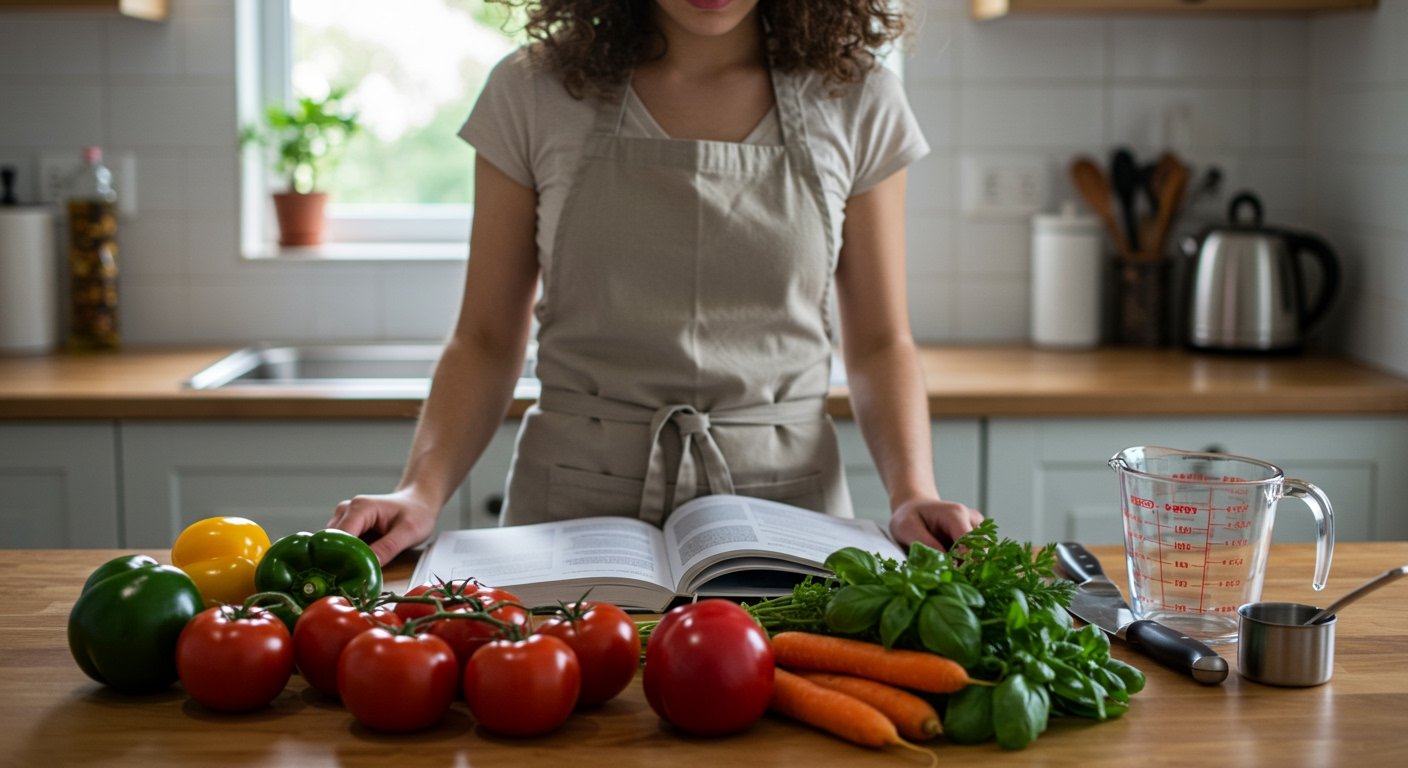
Mindset Matters: Overcoming Intimidation
Remember the statistics: many people feel intimidated. The best *beginner cooking tips* involve a shift in perspective:
- Embrace Imperfection: Your first attempts might not be Michelin-star worthy, and that’s perfectly fine! Every experienced chef started somewhere.
- Patience is Key: Cooking is a skill that develops over time. Be patient with yourself and celebrate small victories.
- Focus on Flavor, Not Finesse: Initially, concentrate on making food taste good. Presentation can come later.
Start Simple: Easy Scratch Cooking Recipes for Beginners
For *cooking for beginners*, choose recipes with few ingredients and straightforward instructions. Think about these *beginner-friendly recipes*:
- Pasta with Simple Tomato Sauce: A classic for a reason. Canned tomatoes, garlic, olive oil, and fresh herbs are all you need.
- Scrambled Eggs or Omelets: Perfect for breakfast, lunch, or a quick dinner, teaching you heat control.
- Roasted Vegetables: Toss your favorite vegetables (broccoli, carrots, potatoes) with olive oil, salt, and pepper, then roast until tender and slightly caramelized.
- Grilled Cheese and Tomato Soup: A comforting meal that’s hard to mess up.
- One-Pan Chicken and Veggies: Minimal cleanup, maximum flavor.
Essential Kitchen Tools: Your Culinary Companions
You don’t need a gourmet kitchen to start, but a few essential kitchen tools will make your life much easier. Here’s a basic list:
- Good Quality Knife Set: A chef’s knife, a paring knife, and a serrated knife are a great start.
- Cutting Board: Protect your countertops and your knife blades.
- Pots and Pans: A small saucepan, a large pot (for pasta), and a skillet/frying pan are versatile.
- Mixing Bowls: Various sizes for prepping ingredients.
- Measuring Cups and Spoons: Accuracy is important in baking and often helpful in cooking.
- Spatulas, Ladles, Tongs: For flipping, stirring, and serving.
- Colander: For draining pasta or washing vegetables.
- Sheet Pans: Ideal for roasting vegetables or baking.
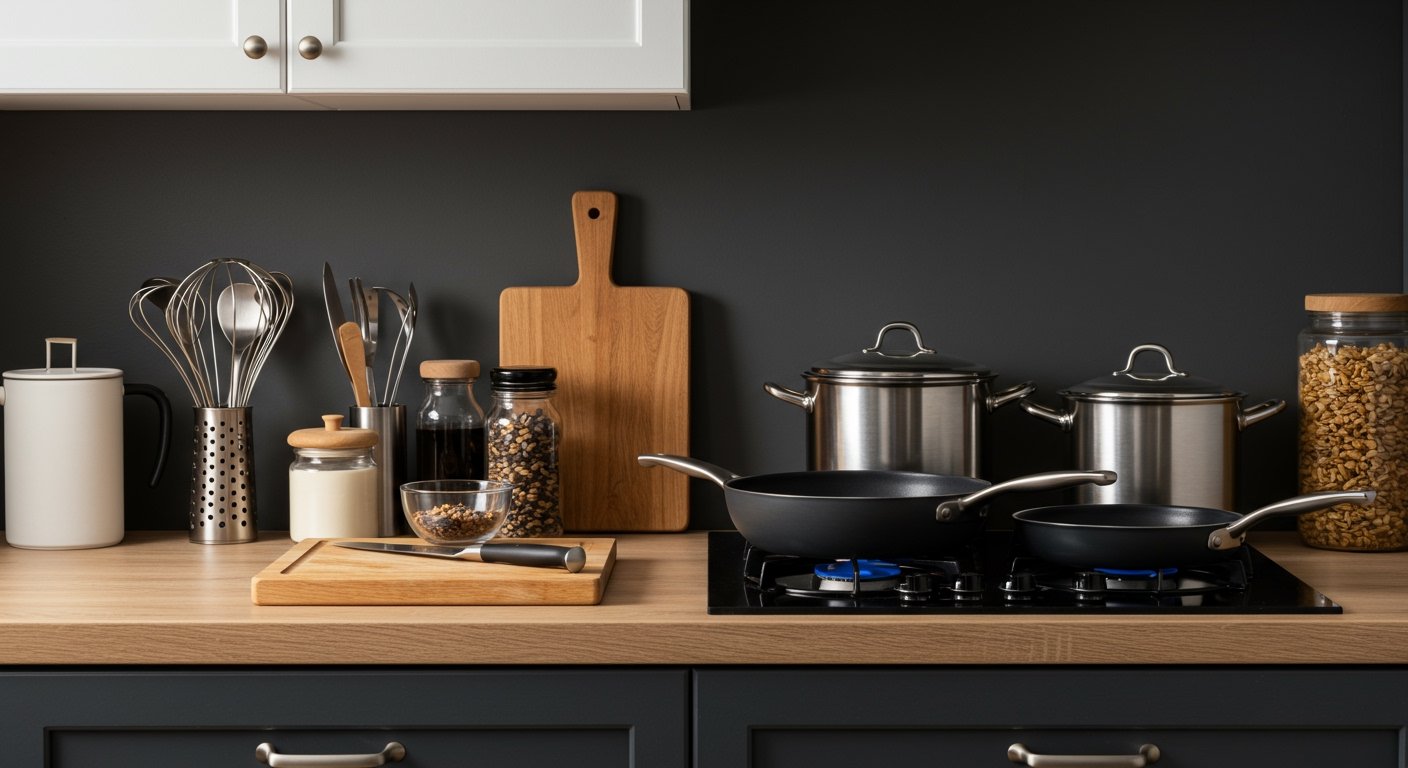
What are the Essential Ingredients for Cooking from Scratch? Building Your Pantry
Having a well-stocked pantry is crucial for *how to start cooking at home*. These *cooking ingredients list* staples mean you’re always ready to whip up a meal.
Pantry Staples
- Grains: Rice (white/brown), pasta, oats.
- Canned Goods: Diced tomatoes, tomato paste, beans (black, cannellini, chickpeas), tuna.
- Oils & Vinegars: Olive oil, vegetable oil, apple cider vinegar, balsamic vinegar.
- Flour & Sugar: All-purpose flour, granulated sugar.
- Salt & Pepper: Essential for seasoning everything.
Fresh Produce & Proteins
Keep these on hand for versatility:
- Aromatics: Onions, garlic (fresh or minced), ginger.
- Root Vegetables: Potatoes, carrots.
- Leafy Greens: Spinach, kale (great for healthy scratch meals).
- Versatile Proteins: Eggs, chicken breasts/thighs, ground meat (beef, turkey), firm tofu, lentils (dried or canned for quick use). [9, 15]
Herbs & Spices
Herbs and spices are the secret to transforming simple ingredients into something extraordinary. Stock up on common ones like oregano, basil, thyme, cumin, paprika, chili powder, and red pepper flakes. Learn more about the differences and uses of fresh vs. dried herbs to elevate your dishes.
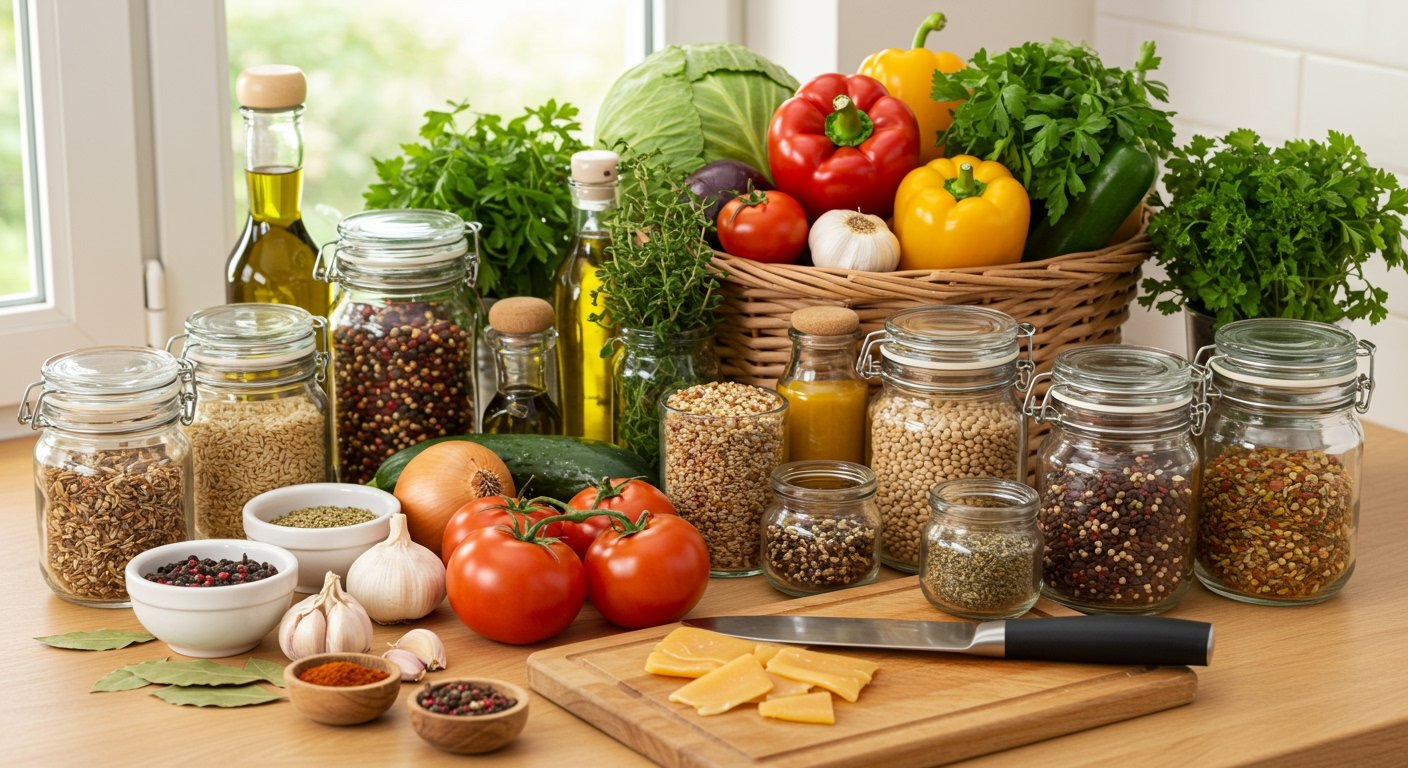
Basic Cooking Techniques: Your Foundation for Delicious Meals
Understanding *basic cooking techniques* will empower you to tackle almost any recipe. These are fundamental skills for *how to cook from scratch*.
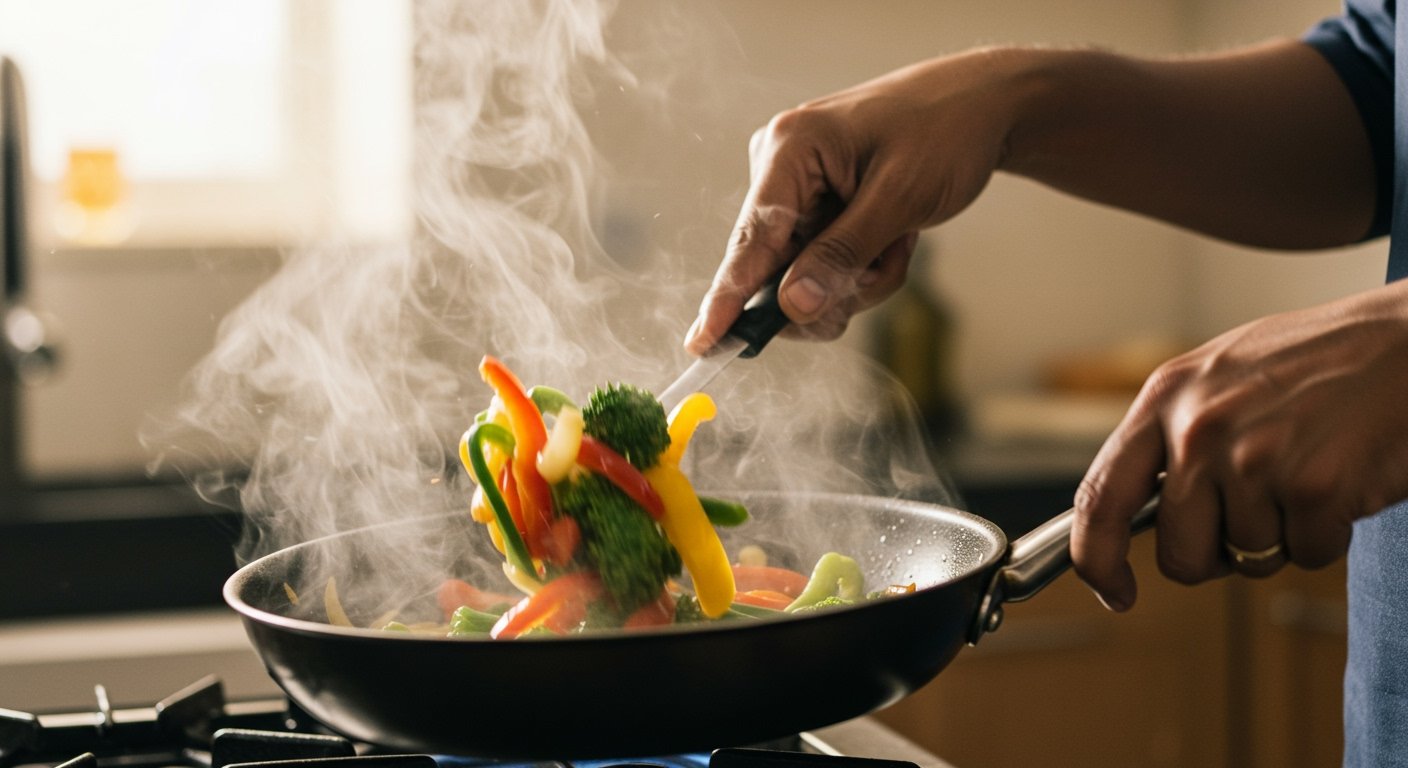
Master Knife Skills
Efficient and safe knife handling is a game-changer. Learning to chop, dice, and mince properly will speed up your prep time and make cooking more enjoyable. Practice makes perfect! For detailed guidance, check out our guide on how to master basic knife skills for home cooks.
Sautéing, Roasting, Boiling: Your Go-To Methods
- Sautéing: Cooking food quickly in a small amount of fat over medium-high heat. Great for vegetables, thin cuts of meat, or developing flavor for sauces.
- Roasting: Cooking food in an oven with dry heat, usually at higher temperatures. Ideal for vegetables, potatoes, and larger cuts of meat, giving them a lovely caramelized crust.
- Boiling/Simmering: Cooking food in hot liquid. Boiling involves rapid bubbling, while simmering is gentler. Perfect for pasta, rice, and soups.
Seasoning Like a Pro
Taste, taste, taste! Season your food as you go, not just at the end. Salt, pepper, and herbs are your friends. A pinch here, a dash there – it makes all the difference. Don’t be afraid to experiment with different flavor combinations.
How to Make Cooking from Scratch Easier: Tips for Beginner Cooks
Making *simple homemade meals* a regular part of your routine is achievable with a few smart strategies, addressing the common concerns about time and complexity. [13, 15]
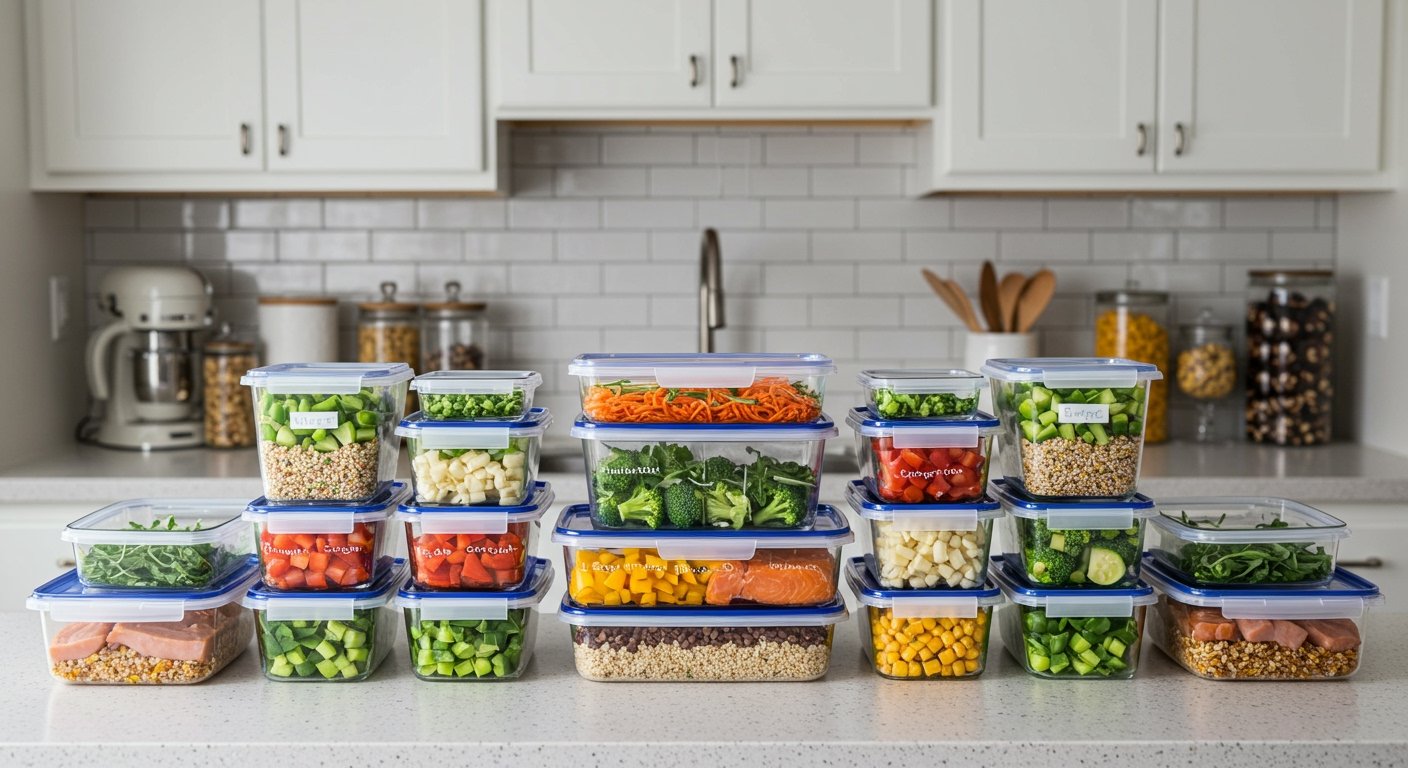
Meal Planning for New Cooks
“Menu planning is one of the best ways to cook healthy meals.” [13] This is arguably the most impactful *beginner cooking tip*. Dedicate 15-30 minutes each week to plan your meals:
1. Check Your Pantry: See what ingredients you already have.
2. Choose Recipes: Select 3-5 *beginner friendly recipes* that align with your schedule.
3. Make a Grocery List: Stick to your list to avoid impulse buys and ensure you have everything you need.
Efficient Meal Prep for Beginners
This strategy is a lifesaver for busy weeknights. On a less hectic day (like Sunday), prep ingredients for the week ahead:
- Chop vegetables for multiple meals.
- Cook a batch of grains like rice or quinoa.
- Prepare dressings or sauces.
- Cook larger quantities of protein (e.g., roast a whole chicken) to use in different dishes throughout the week. [9, 13]
Embrace Simple Homemade Meals & Beginner-Friendly Recipes
Don’t try to cook a five-course meal on your first attempt. Focus on dishes that have few steps and forgiving ingredients. As you gain confidence, you can gradually try more complex recipes. Remember, the goal is to enjoy the process and the delicious results.
Quick and Easy Scratch Meals for Busy Weeknights
Even when time is short, you can still enjoy *healthy scratch meals*. Here are some ideas for *quick and easy scratch meals*:
- Stir-fries: Combine quick-cooking protein (chicken, shrimp, tofu) with a bag of frozen stir-fry vegetables and a simple sauce (soy sauce, ginger, garlic). Serve over pre-cooked rice. [13]
- Pasta Aglio e Olio with Greens: Garlic and oil pasta. Sauté garlic in olive oil, toss with cooked pasta, red pepper flakes, and a handful of spinach. Add grilled chicken for extra protein.
- Quesadillas: Fill tortillas with cheese, pre-cooked chicken or beans, and sautéed veggies. Cook in a pan until golden and cheese is melted.
- Sheet Pan Dinners: Toss protein (sausage, chicken, fish) and chopped vegetables with oil and seasonings on a single sheet pan and roast. Minimal cleanup and delicious!
- Big Salads with Homemade Dressing: Start with a base of greens, add leftover cooked protein, hard-boiled eggs, canned beans, and a variety of fresh vegetables. Whisk together a simple vinaigrette (oil, vinegar, Dijon mustard, salt, pepper). [13]
Always ensure your food is cooked to safe temperatures to prevent foodborne illness. The U.S. Department of Health & Human Services provides excellent guidance on food safety, including internal temperature charts for various foods. For example, ground meats should reach 160°F, and all poultry 165°F. 1, 3, 6] You can find more comprehensive information on safe food handling practices at [FoodSafety.gov. For general nutritional guidance and healthy eating tips, consult resources like the Mayo Clinic Healthy Eating section. [5, 12]
Key Takeaways
- Starting to cook from scratch is an achievable goal, even for beginners, despite initial intimidation.
- Home cooking offers significant benefits, including healthier meals, cost savings, and skill development.
- Begin with simple recipes, equip your kitchen with essential tools, and stock a basic pantry.
- Mastering fundamental techniques like knife skills, sautéing, and roasting builds a strong culinary foundation.
- Effective meal planning and prepping are key strategies for making scratch cooking easier and more time-efficient.
- Even on busy days, quick and easy scratch meals are possible with smart ingredient choices and planning.
